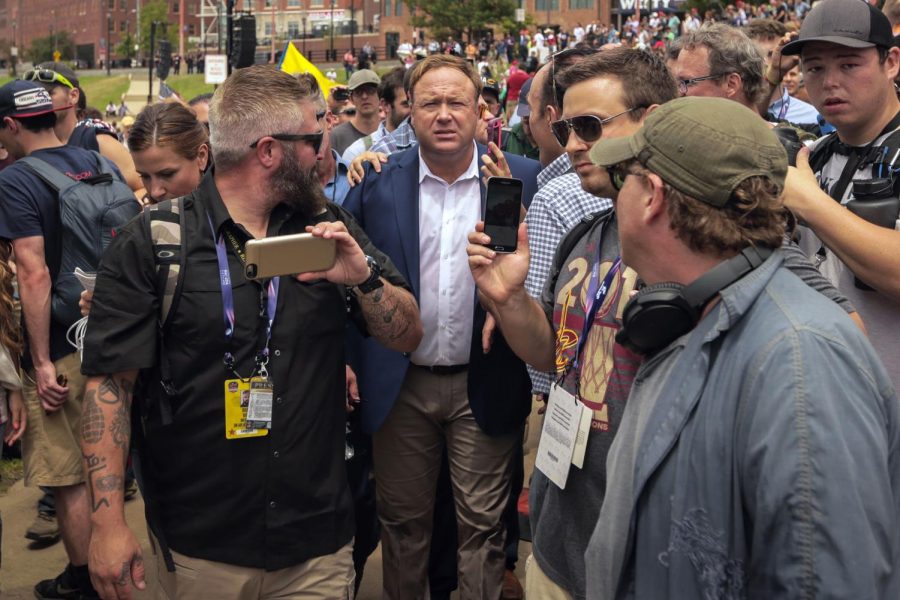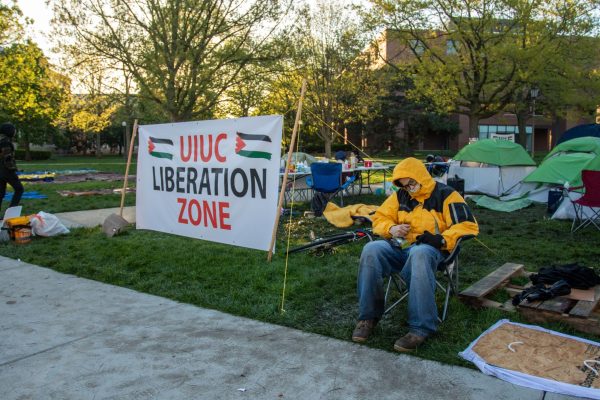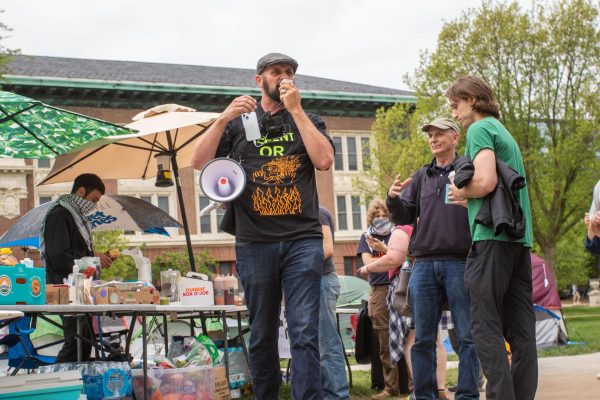Jones has the right to freedom of speech
September 20, 2018
“Chemtrails are real.”
“The reason there are so many gay people now is because it’s a chemical warfare operation. I have the government documents where they said they’re going to encourage homosexuality with chemicals so people don’t have children.”
“It took me about a year with Sandy Hook to come to grips with the fact that the whole thing was fake.”
These are some of the many ludicrous and blatantly false claims that Alex Jones, the founder of “Infowars” and host of the “Alex Jones Show,” believes to be true. Any sane, rational individual would dismiss these opinions and not give Jones another thought. Yet, he seems to be unnaturally pervasive in the public sphere.
I am not here to defend Jones’ opinions, nor am I going to criticize social media platforms for banning individuals. Rather, I will explain why the justification used to ban Jones is a dangerous path to tread upon.
Get The Daily Illini in your inbox!
In his most recent public appearance, Jones appeared at Capitol Hill, the same day the Senate Intelligence Committee and House Energy and Commerce Committee met with Facebook’s COO, Sheryl Sandberg, and Twitter’s CEO, Jack Dorsey. This comes after Jones was banned from a variety of social media platforms, including YouTube, Facebook and Twitter in August. These are private companies; as long as they abide by their community standards and treat all users equally, there are no problems.
This hasn’t been the case. These platforms have targeted conservative speakers and have silenced them. Even Jack Dorsey admitted that Twitter is significantly “left-leaning.” The most egregious example of this censorship was the Sarah Jeong and Candace Owens debacle. Jeong published a series of racist tweets aimed at white individuals and faced no repercussions from Twitter. Owens, a noted African-American right-wing provocateur, replaced the word “white” with “black” and her account was immediately suspended. This is only one of the many troubling incidents that have transpired on these platforms.
As social media takes over the roles held by traditional media platforms, like radio, TV and newspapers, they also have to adjust to the higher ethical standards of these platforms. This includes providing fair, balanced viewpoints of different issues, as well as being a forum where free speech is protected. And it seems the moderators of these sites don’t have a clear understanding of what that means.
The First Amendment isn’t a privilege bestowed to us by our government, it’s a human right that cannot be infringed upon by the government except in certain, extreme cases. Supreme Court case Brandenburg v. Ohio states that “imminent lawlessness” action is one of the few situations where we can reasonably prohibit our freedom of expression. Jones’ delusional rants do not come anywhere close to provoking such action.
The point of free speech isn’t to share factual statements, it’s to safeguard the ability to hold and articulate ideas and opinions without being censored or silenced. In Susan B. Anthony List v. Driehaus and the subsequent Supreme Court case Susan B. Anthony List v. Ohio Election Commission the Supreme Court unanimously struck down an Ohio election law that prohibited factually incorrect statements. Regarding the case, District Judge Timothy Black said, “We do not want the government deciding what is political truth — for fear the government might persecute those who criticize it. Instead, in a democracy, the voters should decide.”
The same reasoning can be applied to moderating these public forums. By choosing which individuals are allowed to speak, these companies set a dangerous precedent. Worse, it infantilizes users by implying they are unable to think for themselves and cannot determine fact from fiction. There is no danger in exposing individuals to controversial ideas. In fact, people like Jones are healthy for our freedom of expression by pushing the envelope and ensuring we put opposing political views into perspective.
In 1920, we began the War on Alcohol. We ended up with organized crime, thousands of deaths from improperly distilled alcohol and the 21st Amendment. In 1971, we began the War on Drugs. We ended up with more than a trillion dollars wasted and the highest incarceration rate in the world. In 2001, we began the War on Terror. We ended up with the Patriot Act and widespread human rights violations.
And in 2018, we begin the War on Free Speech. Attempting to stifle speech and control expression will not end well.
Ajay is a junior in Engineering.







